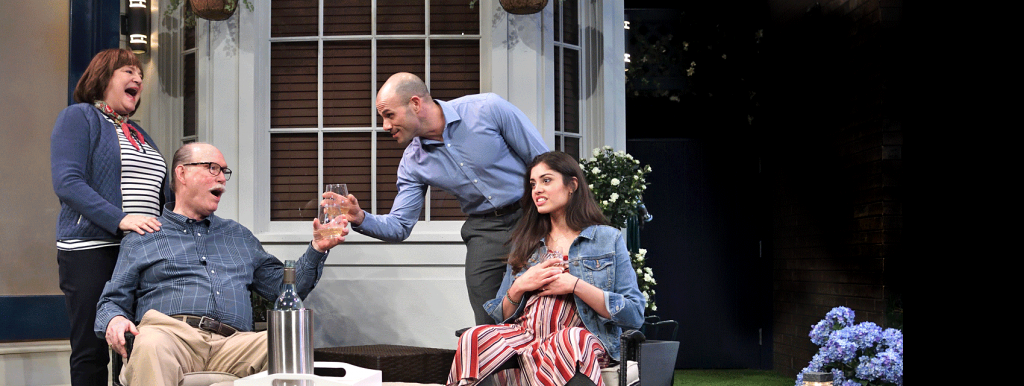In a world shaken by a global pandemic and multiple armed conflicts, Death and the Maiden director, Eddie DeHais, knew they wanted their senior thesis to be about resilience.
“A lot of people are afraid that they’ll be defined by terrible things that happened to them and don’t want to be judged for that, or treated like glass,” Eddie explained. “With this production, we hope to ask: How do survivors not just survive, but thrive?”
Death and the Maiden follows Paulina, a former activist against a violent regime who was tortured and raped by one of its leaders. After the corrupt administration falls, she tries to start anew with her husband, Gerardo. But Paulina’s past catches up to her when Gerardo’s assisted by Roberto when he gets a flat tire. Paulina believes Roberto to be her torturer.
“We as a people became desensitized to these sorts of things and the people harmed by them to the point that they just become numbers,” Eddie said. “But it’s also really hard because we are emotionally overloaded from all of these conflicts, plus what’s going on in our personal lives. We are crafting a play that allows us to look at the story of one woman, one marriage, one story in a way that revives our hearts and electrifies us into feeling not just for this woman’s pain, but also to help us process our own journeys.”
Paulina, Eddie said, is stuck. She’s emotionally stunted to the point that it’s never made clear to the audience what in the play is real and what is in Paulina’s head. Having studied as a clown at L’École Clown et Comédie Francine Côté in Montreal, Eddie knows that humor and surrealism are often go-to coping mechanisms when dealing with trauma. Eddie describes the show’s sense of humor as “biting” since it tackles darker themes.
Helena Tafuri, the actress cast as Paulina, agreed with this concept. She noted that she and her colleagues didn’t expect to laugh so much during their first rehearsal.
“People who have gone through terrible things laugh, and we like to explore that,” Helena said. “I’ve felt very supported and seen and everyone’s been very empathetic with the show and its themes.”
To prepare for this role, Helena also researched life under dictatorships such as Augusto Pinochet’s in Chile, from which Death and the Maiden playwright Ariel Dorfman himself escaped.
“I’ve been listening to the stories of the people in Chile that were victims during the regime,” Helena said. “But just seeing conflict over a bunch of different places and about how people have grown, how people have healed, listening to people who do work with trauma victims, and how they approach that has been really helpful. For Paulina, I’m becoming familiar with all facets of her and how the relationship with your predator or perpetrator is complicated. Relationships with your loved ones are complicated when you’ve suffered a trauma, so we’re just making space for that and exploring all the different avenues.”
Rounding out the cast are Brown/Trinity Rep alumni Michael Rosas as Gerardo and Marcel Mascaró as Roberto, along with opera singer Aliana de la Guardia as an original character created for the show, “The Moon.”
“The play has three named characters in the script, but when I read the stage directions, I noticed how the playwright frequently mentioned the moon and the tides,” Eddie noted. “I realized that I could not create this world without this moon, who in my version became this woman who shows that Paulina isn’t alone. Originally, I wanted the moon to be portrayed as a dancer, but listening to Schubert, I realized this character had to sing.”
Eddie enlisted Adeliia Faizullina to compose the show’s score, which is inspired by and samples the work of classical composer Franz Schubert. Schubert’s “Death and the Maiden” string quartet is a plot point in this show, leading to its title. According to Eddie, Adeliia’s soundscape creates a raw, visceral world of sound that honors Schubert’s work while still accessible to audiences who may not be familiar with classical music.
What Eddie looks forward to the most, however, is audiences finding catharsis in this exploration of the extremes in joy and tragedy.
“We want the audience to laugh so hard they cry and cry so hard they laugh,” Helena concluded.
Death and the Maiden runs May 5 – 15. Click here to learn more and purchase tickets.
